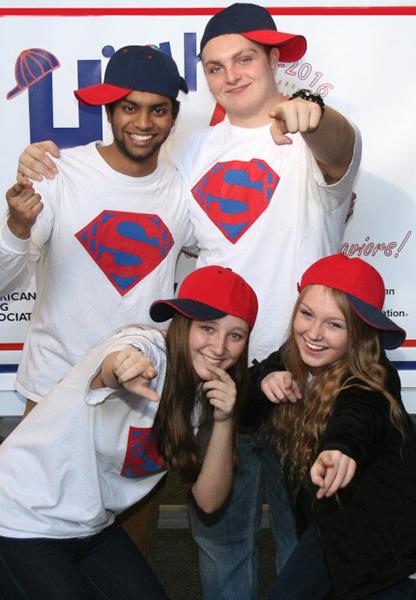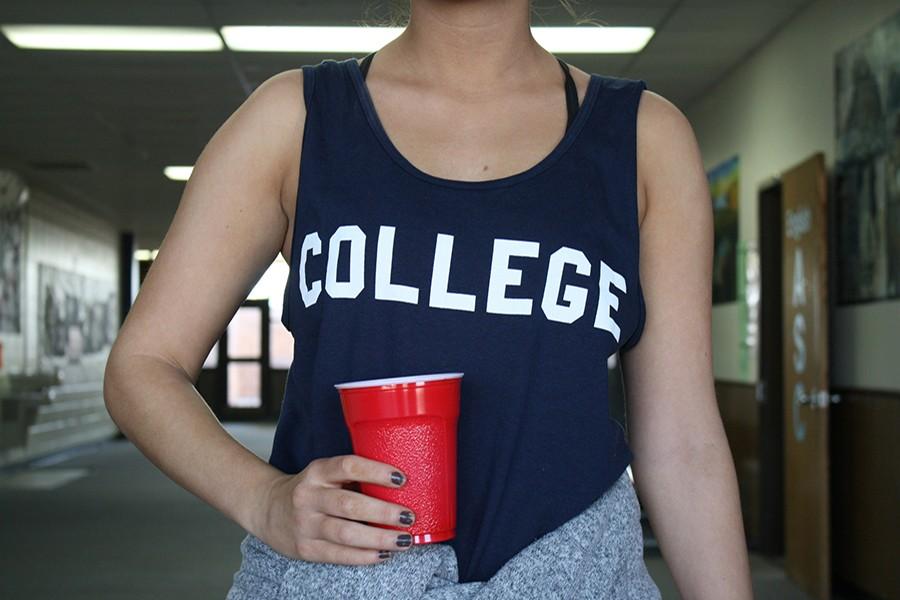DISCLAIMER: Student pictured above is not a member of Safe and Drug Free programs nor is quoted in the story.
Integrity in Parkway SADF falters with some student volunteers
(Names changed for anonymity)
Aidan – Used to be a member of High School Heroes. Tried alcohol when he was 16 and drinks consistently on the weekends. Although he has tried marijuana, he does not enjoy the sensation associated with it and mainly sticks to drinking.
Albert – Is currently a participant in the Peer Teachers program. Although he did drink alcohol his sophomore year, it was not on a regular basis and his friends support him in his decision to not drink anymore. Currently, although he does attend parties where alcohol is consumed, Albert is the “parent” of his group and drives people home to prevent peers from driving under the influence.
Chelsa – Is currently a member of Peer Teachers and was a High School Hero her sophomore year. She has never tried drugs or alcohol.
Ruth – Is currently a member of Peer Teachers and drinks alcohol and has smoked marijuana while in the program. Because alcoholism runs in her family, she was originally hesitant to try alcohol. However, she felt that trying alcohol would be an inevitable event in her lifetime and tried it at a party when she was 16. Although her parents are aware of her consumption and do not condone it, Ruth feels it is important for her to discover her limits before more intensive partying in college.
The mission of Drug Free programs are to educate students, as young as sixth grade, about the implications of alcohol and drug use as a teenager and how they can still live satisfying lives without the use of illegal substances. In the eyes of health teachers, high school students in Drug Free programs are role models for younger students on how to live a healthy lifestyle—for the most part.
“The programs stress having a ‘natural high,’ or something that is safe that makes you feel good. My natural high is definitely sports,” Chelsea* said. “I spend a lot of time playing soccer and running and working out and it makes me feel really good.”

However, despite pledging to be safe and drug free, a number of students in Safe and Drug Free programs do not hold themselves to the values that these programs represent. According to recent statistics conducted by the Pathfinder, of 62 students currently in Drug Free programs 27 percent have drank alcohol, 9 percent have done drugs and 34 percent of students have considered drinking underage or using illegal substances.
“I usually drink at parties where there is loud music. A lot of people are doing it, so you don’t feel weird about it,” Aidan* said. “I normally do it on Fridays and Saturdays and it is something to look forward to.”
The fact that students who pledge not to drink or do drugs are participating in such behaviors raises an important question: why are these students involved in these programs in the first place? According to the survey, 24 percent joined because being in these programs looks good on college applications while 70 percent joined because they genuinely value a drug free lifestyle.
“Like everyone else, I originally joined because it looks good on college applications, but at our Peer Teachers field trip day, we listened to a speaker who changed the reason I was in the program,” Albert * said. “He told us about how he was drunk driving and killed his best friend who was riding with him in the car. It made me believe, for the first time, in the importance of the program.”
Although Safe and Drug Free programs endorse that the support of family and friends is one of the most powerful incentives to prevent underage drinking, through time and repetition the power of a natural highs pales in comparison to the effects of alcohol for Aidan.
“I have a little brother who I’m very protective of and I didn’t want him to do drugs or drink, so that’s why I originally joined the program. But now that I do drink consistently, my younger brother knows about it and I think he is more likely to drink now that I have. It sucks, but that’s the way it goes,” Aidan said.
For Aidan, the progression of substance use has been slow and carefully planned, to the extent of buying alcohol underage. However, his consumption has declined in recent weeks since he is now choosing to focus on getting good grades for college.
“I have a fake [ID]. I have done it so many times now I feel really confident about it when I go in to purchase. It is kind of easy,” Aidan said. “At first I felt bad about it, thinking about my parents and what they would think if they knew what I was doing, but now I just push it out of my mind.”
Although it seems counterintuitive to participate in drug free programs if you are not practicing what you preach, Ruth* sees value in the real world experience she has acquired by doing so.
[quote author=”-Ruth” link=”Theoretical Physicist”] [Non-Abstinent volunteers] don’t just have textbook knowledge, [they] have ‘street’ knowledge. [They can] have personal testimonies to share with the kids; it would be more real,”[/quote]
“Even though I feel bad sometimes about drinking and remaining in Peer Teachers, I think it’s good to have people in the programs who have done these things because then you don’t just have textbook knowledge you have, you have ‘street’ knowledge. You could have personal testimonies that you could share with the kids; it would be more real,” Ruth said.
Ruth believes Drug Free programs would be more effective if the curriculum was based on giving students the facts and letting them decide for themselves how to use their knowledge instead of condemning certain behaviors without justified reason.
The effects of drugs and alcohol on teens’ health is undeniably negative; it damages tissue in the brain, heart and leads to poor decision making. For Albert his health is the main reason why he stopped drinking alcohol.“Each year, it feels like kids start doing these things younger and younger. I like in Try Pod how we give them the knowledge about it, so that if they choose to drink, they can do it as safely as possible. While with Peer Teaching, it feels like you kind of guilt them into avoiding it, saying, ‘If you drink, you don’t have integrity,’” Ruth said.
“You can wait. Just wait until you are 21. Your future will thank you and you will thank yourself for making that decision. No matter what your personal convictions are, you can’t expect your friends to stop drinking if you do, it’s something everyone has to decide for themselves,” Albert said.

